
Con motivo del inicio del nuevo espacio “Encuentros de Bienestar”, en la comunidad de @holos-lotus, la amiga @janettyanez nos deja esta interesante iniciativa, para compartir nuestras impresiones sobre la lectura de la primera parte de la famosa obra de crecimiento personal: “Quién se ha llevado mi queso”, del escritor y psicólogo estadounidense, Spencer Johnson.
Aún cuando conocía la existencia de este libro (desde hace mucho tiempo) nunca había encontrado el momento oportuno para leerlo. Diferentes motivos me habían mantenido alejado de él. Y la verdad es que debo agradecer a la amiga @janettyanez por haber escogido esta obra como primera lectura para ser discutida en el espacio “Encuentros de Bienestar”, porque el libro tiene grandes enseñanzas, muy útiles para los tiempos que corren.
Lo primero a decir es que la obra es muy amena, se lee con mucho agrado. Está escrita en un lenguaje sencillo que no presenta mayores problemas para su comprensión. Se ve que el escritor se empeñó en dejarnos un texto amable, donde todos pudiéramos acceder fácilmente a los mensajes contenidos en él.
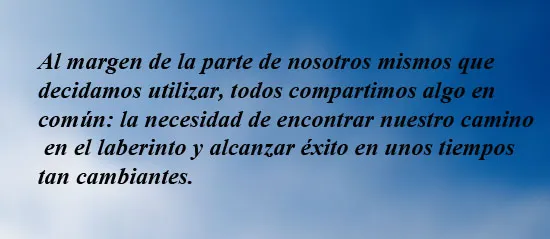
El gran tema del libro es la necesidad de adaptarse a un entorno cambiante, y si me pidieran una conclusión luego de leerlo les diría que es de sabios moverse con los cambios.
El tema del cambio ha inquietado la mente de los hombres desde los tiempos más antiguos. Es célebre aquel aforismo de Heráclito: “nadie puede bañarse dos veces en el mismo río…” Con esta breve sentencia el gran pensador griego nos invita a considerar la cotidianidad de los cambios.
Sin embargo, y aunque pudiera parecer que el cambio es algo obvio, sobre todo en los días que corren, no se llega a esa idea de forma natural. Hay que hacer un serio ejercicio de reflexión para tomar conciencia de que los cambios están ocurriendo a nuestro alrededor.
Para la gente de mi generación la idea del cambio no era fácil de asumir, la vida transcurría entre parámetros bien delimitados, en vez de cambio se fortalecía más la idea de lo permanente.
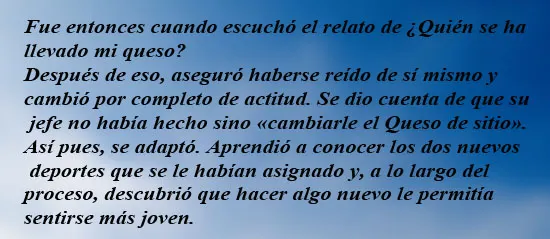
Se vivía toda la vida en la misma casa, los padres morían al lado de sus hijos y nietos, la familia era una unidad casi monolítica, se aspiraba ingresar a un empleo y permanecer en él hasta que llegara el tiempo de la jubilación, había pocos canales de televisión por lo que todos hablábamos de los mismos temas relacionados con la cultura pop. En fin, el ritmo y la dinámica de la vida no facilitaban la percepción del cambio.
En nuestros días las cosas son muy distintas, los empleos son volátiles, se requiere aprender nuevas habilidades en períodos cortos de tiempo, las familias tienen otras dinámicas… Pareciera que sería natural percibir los cambios, sin embargo, tampoco es así.
Si usted vive aislado de la tecnología y el internet su mundo puede transcurrir con bastante lentitud, lo que no facilita la percepción del cambio. Por ejemplo, yo vivo en una zona en los límites de la ciudad, al pie de las montañas. Es un sitio donde hay gente de diferentes estratos sociales.
Por condiciones propias de nuestro país la mayoría de mis vecinos ha ido quedando al margen de la tecnología. Nuestro paisaje es básicamente el mismo desde hace unos cuarenta años, las mismas casas de un solo nivel, las mismas calles, el mismo alumbrado eléctrico, la misma cancha, la misma escuela... Para la gente de mi comunidad no es fácil darse cuenta de los grandes cambios que ocurren en el mundo exterior a nuestro sitio, y estoy seguro que no somos una excepción en el planeta.
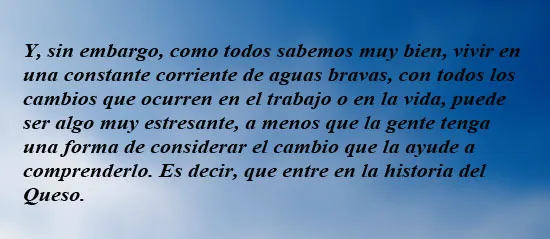
Sin embargo, es claro que aunque no nos demos cuenta de que hay cambios a nuestro alrededor, estos siguen generándose en todos los niveles, y en algunos casos de un modo realmente vertiginoso, baste pensar en el sector de las comunicaciones. Al no percibir los cambios, seguimos como si nada, y la consecuencia de esa actitud es quedarnos rezagados, sin posibilidad alguna de tener un boleto para el tren del progreso.
Uno de los grandes méritos del libro “Quien se ha llevado mi queso”, es que nos lleva a pensar en situaciones conocidas. Los personajes del libro tienen actitudes y respuestas muy parecidas a las que nosotros podemos dar. Los ejemplos y los testimonios recogidos en el libro lo hacen muy verosímil. Nos lleva a decir: ¡caramba, las cosas son así...! ¡Cómo no había caído en cuenta de esto...! ¡Cómo no me había dado cuenta que estoy actuando de este modo...! ¡Cómo no había calculado estas consecuencias…!
El libro nos deja un buen repertorio de situaciones para reflexionar sobre la importancia de aprender a convivir con los cambios. A partir de esas reflexiones podemos generar unas cuantas herramientas para estar más atentos y que los cambios no nos tomen desprevenidos.
Les recomiendo ampliamente esta obra. Estoy seguro que nos dará material para una buena conversación, @janettyanez y yo estaremos encantados de moderar la reunión para intercambiar, junto a ustedes, nuestras impresiones sobre el texto. Nos vemos el diez de agosto, a las ocho de la noche, en el servidor de @holos-lotus.
Gracias por tu tiempo.
Las citas textuales corresponden a una versión digital del libro, “Quién se ha llevado mi queso”, que circula en la Web.


On the occasion of the beginning of the new space "wellness meetings", in the @holos-lotus community, our friend @jannetyanez leaves us this interesting initiative to share our impressions about the reading of the first part of the famous work of personal growth: "Who took my cheese", by the American writer and psychologist, Spencer Johnson.
Even though I knew about the existence of this book (for a long time) I had never found the right moment to read it. Different reasons had kept me away from it. And the truth is that I must thank the friend @jannetyanez for having chosen this work as first reading to be discussed in the space "wellness meetings", because the book has great teachings, very useful for the times we live in.
The first thing to say is that the book is very pleasant to read. It is written in a simple language that does not present major problems for its comprehension. It can be seen that the writer was determined to leave us a friendly text, where everyone could easily access the messages contained in it.
The great theme of the book is the need to adapt to a changing environment, and if you were to ask me for a conclusion after reading it, I would tell you that it is wise to move with the changes.
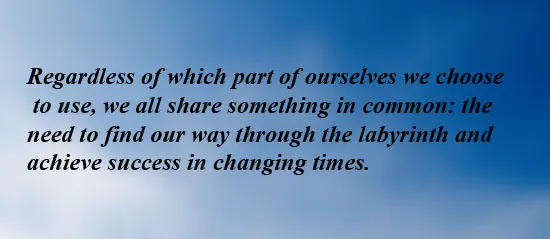
The subject of change has troubled the minds of men since the most ancient times. That aphorism of Heraclitus is famous: "no one can bathe twice in the same river..." With this brief sentence the great Greek thinker invites us to consider the everydayness of change.
However, and although it might seem that change is something obvious, especially in these days, we do not arrive at the idea of change. We do not come to the idea of change naturally, we have to make it consciously through a deliberate process of reflection.
For people of my generation, the idea of change was not easy to assume, life passed within well-defined parameters, and instead of change, the idea of permanence was strengthened.
We lived all our lives in the same house, parents died next to their children and grandchildren, the family was an almost monolithic unit, we aspired to get a job and stay in it until retirement time, there were few television channels so we all talked about the same topics related to pop culture. In short, the rhythm and dynamics of life did not facilitate the perception of change.
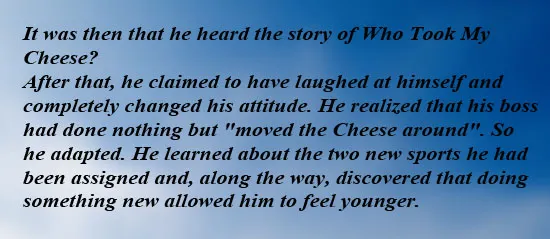
Nowadays things are very different, jobs are volatile, new skills need to be learned in short periods of time, families have other dynamics... It would seem that it would be natural to perceive changes, however, this is not the case either.
If you live isolated from technology and the internet, your world can move quite slowly, which does not make it easy to perceive change. For example, I live in an area in the city limits, at the foot of the mountains. It is a place where there are people from different social strata.
Due to the conditions of our country, most of them have been left aside from technology. Our landscape has been basically the same for about forty years, the same one-story houses, the same streets, the same electric lighting, the same field, the same school.... For people in my community it is not easy to notice the great changes that occur in the world outside our place, and I am sure we are not an exception on the planet.
However, it is clear that even if we do not realize that there are changes around us, they continue to be generated at all levels, and in some cases in a really dizzying way, just think of the communications sector. By not perceiving the changes, we continue as if nothing had happened, and the consequence of this attitude is that we are left behind, with no chance of getting a ticket on the train of progress.
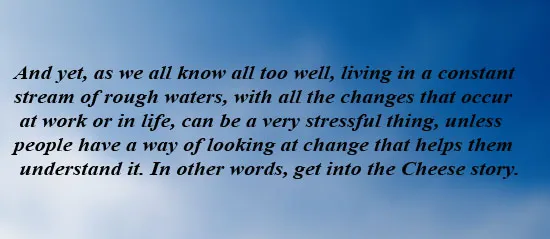
One of the great merits of the book "Who Took My Cheese" is that it makes us think about familiar situations. The characters in the book have attitudes and responses very similar to those we can give. The examples and testimonies collected in the book make it very plausible. It leads us to say: gee, this is how things are, how I had not realized this, how I had not realized that I am acting in this way. How could I not have calculated these consequences?
The book leaves us with a good repertoire of situations to reflect on the importance of learning to live with change. From these reflections we can generate a few tools to be more attentive so that changes do not take us unawares.
I highly recommend this book. I am sure it will give us material for a good conversation on August 10th when we will meet at eight o'clock in the evening, on the @holos-lotus server, to discuss the reading.
Thank you for your time.
The textual quotations correspond to a digital version of the book, "Quién se ha llevado mi queso", which is circulating on the Web.
Translated with www.DeepL.com/Translator (free version)

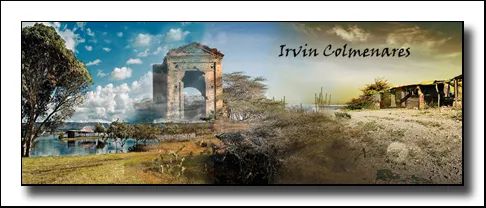




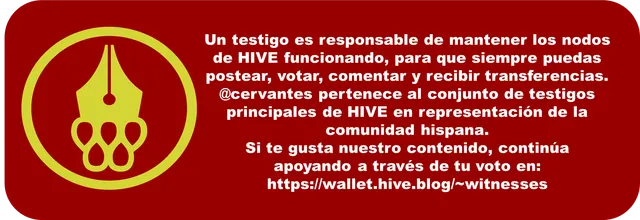
Te invito a apoyar este proyecto como witness y a formar parte de esta gran comunidad uniéndote a su Discord en el siguiente enlace:
Discord de la comunidad Cervantes

You can vote for @ocd-witness, with HiveSigner or on Hive Witnesses.


Banner obsequio de los amigos de @rutablockchain



Banner obsequio de los amigos de @rutablockchain
